
AUTONOMOUS AGENTS AND MULTI-AGENT SYSTEMS
Scope & Guideline
Transforming Ideas into Intelligent Solutions
Introduction
Aims and Scopes
- Multi-Agent System Design:
Explores the principles and methodologies for designing effective multi-agent systems, including agent interaction, negotiation, and cooperation. - Reinforcement Learning in Multi-Agent Contexts:
Focuses on the application of reinforcement learning techniques within multi-agent settings, addressing challenges like coordination, communication, and shared learning. - Mechanism Design and Game Theory:
Investigates game-theoretic approaches and mechanism design principles to analyze and create systems that promote desired outcomes in agent interactions. - Human-Agent Interaction:
Studies the dynamics of interactions between humans and autonomous agents, including trust, communication, and the integration of human feedback into agent decision-making. - Social and Ethical Implications of Agents:
Addresses the ethical considerations and social impact of deploying autonomous agents, including fairness, accountability, and transparency in their decision-making processes.
Trending and Emerging
- Deep Reinforcement Learning Applications:
There is a marked increase in research applying deep reinforcement learning techniques to complex multi-agent environments, showcasing advancements in scalability and performance. - Trust and Ethical AI:
Emerging themes around trustworthiness and ethical considerations in AI and agent interactions are gaining attention, with studies focusing on transparency and accountability in decision-making. - Collaborative and Cooperative Systems:
The trend towards developing systems that promote cooperation among agents is on the rise, with an emphasis on emergent behaviors and collective decision-making processes. - Interdisciplinary Approaches:
Research increasingly incorporates insights from social sciences, economics, and psychology to enhance the design and functionality of multi-agent systems, reflecting a broader understanding of agent interactions. - Adaptive and Context-Aware Agents:
The development of agents that can adapt to changing environments and contexts is a growing focus, highlighting the importance of flexibility and responsiveness in autonomous systems.
Declining or Waning
- Static Game Theoretical Models:
There has been a noticeable decrease in publications focusing on static models of game theory, as the field shifts towards dynamic and adaptive approaches that better reflect real-world complexities. - Basic Algorithmic Strategies:
Research focusing solely on traditional algorithmic strategies without considering their application in complex environments or interactions has diminished, indicating a move towards more integrated approaches. - Single-Agent Systems:
The focus on single-agent systems has waned, as the community increasingly recognizes the importance of multi-agent interactions and their implications for system performance and behavior.
Similar Journals
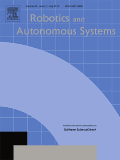
ROBOTICS AND AUTONOMOUS SYSTEMS
Leading the Charge in Robotics and Automated Technologies.ROBOTICS AND AUTONOMOUS SYSTEMS, published by Elsevier, is a leading journal in the fields of robotics and automation, providing a platform for the dissemination of high-quality, peer-reviewed research. With an impressive impact factor and a prestigious reputation, this journal is classified in the Q1 category for major fields including Computer Science Applications, Control and Systems Engineering, Mathematics, and Software as of 2023. The journal boasts an extensive archive dating back to 1988, reflecting the evolution of the discipline and fostering innovative research discussions that are crucial for advancements in autonomous technologies. Researchers, professionals, and students are encouraged to contribute to and benefit from the ongoing dialogue within these dynamic fields. Accessible through various academic resources, ROBOTICS AND AUTONOMOUS SYSTEMS stands as a pivotal information source for those dedicated to exploring the frontiers of intelligent systems.

AUTONOMOUS ROBOTS
Unleashing Potential in Autonomous Technology.AUTONOMOUS ROBOTS, published by SPRINGER, is a leading academic journal that serves as a pivotal platform for the dissemination of cutting-edge research in the field of Autonomous Robotics. With an ISSN of 0929-5593, this esteemed journal has been at the forefront of innovation since its inception in 1994, and it continues to thrive with a vision extending to 2024 and beyond. Recognized in the Q1 category of Artificial Intelligence, it boasts a commendable ranking of #85 out of 350 in Computer Science and Artificial Intelligence, positioning it within the 75th percentile of researchers' preferred publications. The journal features a range of subjects related to autonomous systems, including but not limited to robot perception, action planning, multi-agent systems, and autonomous interactions, catering to an audience that spans researchers, industry professionals, and students alike. Scholars can access a wealth of peer-reviewed articles that contribute to both theoretical frameworks and practical applications, ensuring the relevance of the work published within its pages. Located in Dordrecht, Netherlands, AUTONOMOUS ROBOTS exemplifies a commitment to advancing the science of robotics, making significant contributions to the knowledge base and inspiring new developments within the field.
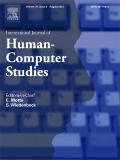
INTERNATIONAL JOURNAL OF HUMAN-COMPUTER STUDIES
Advancing Understanding in Human-Computer InteractionINTERNATIONAL JOURNAL OF HUMAN-COMPUTER STUDIES, published by Academic Press Ltd - Elsevier Science Ltd, stands at the forefront of research dedicated to the dynamic interplay between humans and technology. With a remarkable impact factor reflective of its rigorous academic standards and its prestigious ranking in the Q1 category across vital disciplines such as Education, Engineering, Human Factors and Ergonomics, and Human-Computer Interaction, this journal serves as an essential resource for researchers, professionals, and students alike. Spanning from 1994 to 2024, it showcases pioneering studies that contribute significantly to the understanding of cognitive processes, usability, and the evolving role of technology in society. Despite the absence of Open Access options, access to this journal is facilitated through institutional subscriptions, ensuring that critical findings and advancements are readily available to a global audience. By continuing to publish high-quality research, the INTERNATIONAL JOURNAL OF HUMAN-COMPUTER STUDIES plays a crucial role in advancing the field, fostering innovation, and guiding future research directions.
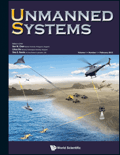
Unmanned Systems
Leading the Charge in Autonomous Vehicle AdvancementsUnmanned Systems is a leading academic journal published by WORLD SCIENTIFIC PUBL CO PTE LTD based in Singapore, that serves as a premier platform for research and advancements in unmanned vehicle technology. Covering a broad range of disciplines, the journal ranks in the Q1 category for Aerospace Engineering, Automotive Engineering, Control and Optimization, and Control and Systems Engineering as of 2023, showcasing its high impact within these fields. With impressive Scopus rankings placing it in the top tiers of its categories—8th in Control and Optimization and 14th in Aerospace Engineering—Unmanned Systems stands out as a vital resource for researchers, professionals, and students eager to explore current trends and innovations. While the journal operates under a traditional access model, it remains committed to disseminating quality original research, reviews, and case studies that contribute significantly to the understanding and application of unmanned technologies from 2013 through 2024.
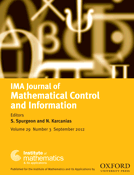
IMA JOURNAL OF MATHEMATICAL CONTROL AND INFORMATION
Pioneering Research in Mathematical Theory and Applications.IMA Journal of Mathematical Control and Information, published by Oxford University Press, is a prestigious journal dedicated to advancing the fields of mathematical control, optimization, and information theory. Since its inception in 1984, it has been a vital resource for researchers and professionals, providing a platform for high-quality scholarly articles that explore innovative methodologies and theoretical advancements. With an impressive Q2 ranking in categories such as Applied Mathematics and Control Systems Engineering, the journal is recognized for its rigorous peer-review process and significant contributions to mathematics and engineering. While it does not currently offer Open Access options, its impact is reflected in its notable Scopus rankings, including a rank of #47 in Control and Optimization. As it continues to converge into 2024, the IMA Journal remains a cornerstone for academics and practitioners seeking to deepen their understanding and application of mathematical concepts in control and information systems.

INTEGRATED COMPUTER-AIDED ENGINEERING
Fostering Innovation in Computational MethodologiesINTEGRATED COMPUTER-AIDED ENGINEERING (ISSN: 1069-2509, E-ISSN: 1875-8835) is a prominent journal published by IOS PRESS in the Netherlands, renowned for its rigorous coverage of the interdisciplinary fields of artificial intelligence, computational theory, and software applications. Since its inception in 1993, this journal has consistently contributed to the academic discourse, standing out in the Q1 and Q2 quartiles across various categories as of 2023. With Scopus rankings placing it in the93rd percentile for computational theory and mathematics and 91st for theoretical computer science, it is a vital resource for researchers and professionals seeking to explore innovative methodologies and advanced engineering solutions. While not an open-access journal, INTEGRATED COMPUTER-AIDED ENGINEERING provides comprehensive access options for institutional subscribers, ensuring the dissemination of vital research findings to a global audience. This journal aims to facilitate the exchange of knowledge, inspire future studies, and foster technological advancements in computer-aided engineering.
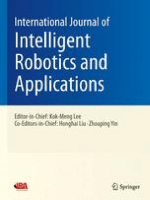
International Journal of Intelligent Robotics and Applications
Connecting Minds to Shape the Future of RoboticsInternational Journal of Intelligent Robotics and Applications, published by SPRINGER SINGAPORE PTE LTD, is a pivotal platform dedicated to advancing the field of robotics and artificial intelligence. With an ISSN of 2366-5971 and an E-ISSN of 2366-598X, this journal has established its presence since its inception in 2017, showcasing innovative research and applications up until 2024. The journal aims to foster interdisciplinary collaboration by publishing high-quality articles that cover a broad range of topics from foundational AI concepts to cutting-edge robotics technologies. It holds respectable rankings, positioned in the Q3 category of Artificial Intelligence and Q2 category of Computer Science Applications in the 2023 metrics, and is indexed in Scopus with notable rankings in both computer science disciplines. Although it follows a subscription model, the journal remains committed to facilitating access to groundbreaking research for its audience of researchers, professionals, and students, contributing to the ever-evolving landscape of intelligent robotics.

Cognitive Computation and Systems
Transforming Ideas into Algorithms for a Smarter Future.Cognitive Computation and Systems is an innovative open-access journal published by Wiley, dedicated to advancing the fields of Artificial Intelligence, Cognitive Neuroscience, and Computer Science Applications. Based in the United Kingdom, this journal has established itself as a key resource for researchers, students, and professionals alike since its inception in 2019. With a focus on the convergence of cognitive theories and computational methodologies, Cognitive Computation and Systems aims to publish high-quality research that bridges holistic cognitive processing with algorithmic design. Although the journal is currently categorized in the lower quartiles of its fields, it provides a unique platform for disseminating pioneering ideas that can drive the vital intersection of computer vision, pattern recognition, and psychology. Scholars can take advantage of its open-access model, ensuring that research findings are freely available, thus promoting wider knowledge sharing and collaboration within these rapidly evolving domains. With its ambitious scope and commitment to quality, this journal is poised to make a significant impact in its respective fields.

AUTOMATION AND REMOTE CONTROL
Bridging Theory and Practice in Engineering ExcellenceAUTOMATION AND REMOTE CONTROL, published by MAIK Nauka/Interperiodica/Springer, is a distinguished international journal renowned for its contribution to the fields of Control and Systems Engineering and Electrical and Electronic Engineering. With an ISSN of 0005-1179 and an E-ISSN of 1608-3032, this journal has been pivotal since its inception in 1973, offering valuable insights and innovative research findings that span the spectrum of automation technologies and control systems. While categorized in the Q3 quartile in both relevant engineering categories as of 2023, it holds a significant position for researchers aiming to disseminate and access quality research in these areas. The journal emphasizes the importance of integrating advanced automation methods and control strategies, fostering the exchange of knowledge among academics, industry professionals, and students alike. Although it does not provide open access options, the compelling research presented within its pages continues to influence the ongoing development of automation systems worldwide.
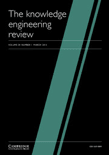
KNOWLEDGE ENGINEERING REVIEW
Driving Excellence in Artificial Intelligence and Software DevelopmentKNOWLEDGE ENGINEERING REVIEW, published by Cambridge University Press, is a prestigious academic journal dedicated to the dynamic fields of Artificial Intelligence and Software Engineering. With an ISSN of 0269-8889 and an E-ISSN of 1469-8005, this journal has been a pivotal platform for scholarly communication since its inception in 1984, with its impact continuously recognized through its Q2 category ranking in both fields as of 2023. Operating from its headquarters in the United Kingdom, it boasts a robust Scopus ranking, placing it in the 73rd percentile for Software and the 69th percentile for Artificial Intelligence, a testament to its influence and relevance. Though it does not offer open access, the journal remains dedicated to advancing knowledge engineering by publishing high-quality research articles, insightful reviews, and innovative methodologies that address both theoretical and practical challenges. Researchers, professionals, and students find this journal an invaluable resource for cutting-edge developments in the realm of knowledge engineering.